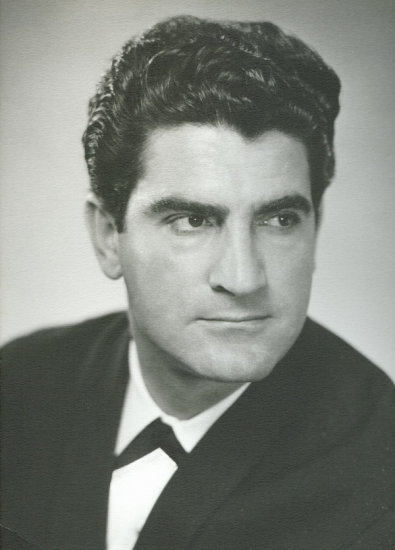
Viguen
Viguen (born Viguen Derderian, Persian: ویگن دردریان, Vigen Derderyân; Armenian: Վիգէն Տէրտէրեան,[a][1] Vigēn Tērtērian;[2] 23 November 1929 – 26 October 2003) was an Iranian pop music singer and actor. He was well known throughout the Near East and was called the "King of Iranian pop" and the "Sultan of Jazz." He was an Iranian Armenian by ethnicity and sang in both Persian and Armenian.[3]
Viguen
Viguen Derderian
23 November 1929
Hamadan, Imperial State of Iran
26 October 2003 (aged 73)
Los Angeles, California, United States
- Rock
- Pop
- Jazz
- Singer
- actor
- Vocals
- guitar
1951–2001
During the golden age of Persian pop (the early 1970s) until the 1979 Islamic Revolution, many Iranian performers and celebrities—among them Delkash, Pouran, and Elaheh—yearned to be associated with him.[4] He moved to the United States in 1971 and lived the rest of his life there, continuing to perform.
Viguen's innovative and upbeat style of music had a great influence on paving the way for a new genre of Iranian music, influenced by Western European and Latin American styles. His musical and performing talents soon captured the attention of many prominent Iranian lyricists and composers such as Parveez Vakili and Kareem Fakkour, and together they created some of Iran's most memorable songs.[4]
Early life[edit]
Viguen was born into an Iranian-Armenian family of eight children in the western Iranian city of Hamadan.[4] His father died of complications related to pneumonia when Viguen was only eight years old.[4] His mother and older brother Zaven raised him after moving away from the family property due to a family disagreement. His older brother Karo was a well-known Iranian poet and wrote the lyrics for Viguen's signature song, "Lala'ee" (Lullaby).
During World War II, the family moved to the northern city of Tabriz where local Azerbaijani nationalists declared the area a separatist republic, with the help of the occupying Soviet forces.[4] This is where Viguen bought his first guitar from a Soviet Armenian soldier[5] and discovered his affinity for American, Italian and Spanish music and adopted many of those melodies for his songs with Persian lyrics that became some of Iran's most popular music to date.[6]
Artistic rising[edit]
In his mid teens, Viguen moved to Tehran and in 1951 he was hired to perform at the Café Shemiran, an upscale restaurant & bar on the northern outskirts of the capital city.[4]
Equated to Elvis Presley by some fans in Iran, Viguen's debonair looks and his tall and athletic physique added to his appeal as Iran's first male pop star, particularly among young Iranian women at a time when ideas of emancipation and liberalism were taking hold in the 1950s and 60s. He was also one of the first Iranian entertainers to perform with a guitar.[4]
Later works[edit]
Viguen moved to the United States in 1971 and settled in California. He would return to Iran yearly to do concerts and perform in Vegas-styled nightclubs. After the Islamic Revolution of 1979, he was exiled to the United States because pop music was no longer allowed in Iran. He celebrated the 50th anniversary of his career at the Hollywood Palladium in Los Angeles in February 2001.[4]
Some of his most notable songs are "Baroon Barooneh" (It's Raining), "Asb-e Ablagh" (Piebald Horse), "Mahtab" (Moonlight), Lala'ee (Lullaby), "Gol-e Sorkh" (Red Rose), "Ragheeb" (Rival), "Simin-bari", "Awazekhan" (The Singer) and "Del-e Divaneh" (Crazy Heart). More than 600 songs were recorded during his long career.
Personal life[edit]
His first wife was named Olga and they had three daughters together, including actress Aylin (also known as Eileen or Ailen), Aylin's fraternal twin sister, singer Jaklin Munns (also known as Jacqueline), and Katrin. His second wife was named Nadia and they had one daughter named, Evelyn, and one son named Edwin Derderian.[11] His third wife was Karen Holston Derderian (1951–2015)[12] and he had a step-daughter, Robin Navonne Brakefield.[11]
Death[edit]
Viguen died at home on 26 October 2003 from cancer and was buried at Pierce Brothers Valley Oaks Cemetery in Westlake Village, California.[6] At the time of his death he had recorded more than six hundred songs, starred in six motion pictures and made guest appearances on various popular TV shows including The Bob Hope Specials, The Jack Benny Show and the TV series Mission Impossible.[13]